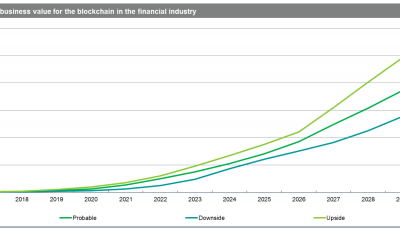What’s Killing Bitcoin? Bitcoiners
Spend 5 minutes on Reddit’s /r/Bitcoin or the popular forum bitcointalk.org and you’ll likely come away with the impression that users believe the banking system is outdated, behind the times and in need of a change. The change they talk about isn’t a minor facelift; Bitcoin believers want wholesale change in how financial institutions do business. This fury lends itself to the belief that Bitcoin can shake up the status quo that believers disdain. Enthusiasts for Bitcoin and other cryptocurrencies are often believers of niche political movements like Anarcho-Capitalism and Libertarianism, and these political beliefs shape their opinions about Bitcoin. The critical problem with Bitcoin is that users are more concerned with being ideologists than technologists.
Bitcoin, and the blockchain that powers Bitcoin, have garnered serious attention. Industry leaders like Goldman Sachs, Bank of America, Forbes, Fortune and a slew of venture capitalists have contributed praise, scrutiny and investment. Somewhere in all this capitalistic enthusiasm, though, exists a disconnect between what investors and financial institutions see as valuable, and what Bitcoin believers see as valuable. Investors seem to be focusing on the blockchain, variably referred to as a distributed ledger, trustless ledger, smart contract and other derivations of the underlying protocol. The proof-of-work protocol that powers the blockchain may end up powering many forms of financial transactions, helping to lessen the burden of audit requirements, KYC/AML constraints and due diligence investigations. Start-up firms like SmartContract, Hedgy and Chain are lining up to exploit this future industry, and current giants like Visa, CitiBank and Merrill Lynch are both monitoring the situation and doing their own research.
Investment in firms specializing in blockchain technology, and not specifically Bitcoin, indicates the speculative interest of investors is focusing away from Bitcoin. This is further evidenced by the choice of investors to not simply buy Bitcoin. When investors think an asset is going to increase in value, they buy it. Witness gold, property and oil bubbles in recent times. If investors thought that Bitcoin as an asset was poised to skyrocket in value they would simply buy Bitcoins rather than investing in firms that service Bitcoin-based activities. To put it bluntly, the actions of investors suggest that faith in Bitcoin is low, but faith in smart contracts and proof-of-work-based ledgers remains high. Why, then, are users on /r/Bitcoin and Bitcointalk so aggressively dismissive of any blockchain technology that isn’t based around Bitcoin?
Here are a few actual quotes I gathered recently from /r/bitcoin regarding blockchain technology: ”There’s nothing to work out, this is marketing droids selling snake oil to suits that can’t parse how/why blockchains work,” in reply to a post about start-ups designing private blockchains. In reply to discussion about banks researching private ledgers, “But if you think you’re going to build your own blockchain and have any hope of competing with the global decentralized permissionless network of bitcoin, you’re the one who ‘doesn’t get it.’”
Consider if the designers of the printing press thought along the same narrow lines: ‘Who would want to print books about science or poetry? Printing presses should only print religious texts.’ Or if early researchers of computer networking had similar tunnel vision about their nascent technology: ‘Computers should only be networked for university and government research. Why would people want to communicate over computers? That’s what phones are for!’ Lastly, another real quote which captures the heart of how Bitcoin believers view themselves and anyone who disagrees with their beliefs: “what? Bitcoin isn’t “from the fintech sector”, it’s from the cypherpunks you ignorants.”
The vitriol with which Bitcoin believers approach blockchain innovation from financial firms not focused on Bitcoin will ultimately doom Bitcoin. The pseudo-tribalism displayed by Bitcoin users will eventually leave them as early adopters of a first-iteration technology in a world that innovates around, and adopts for use, subsequent iterations. Mentioning cypherpunks as the genesis of Bitcoin channels the deeply rooted idea that Bitcoin is made for members of the counterculture, and mainstream use infringes on their ideological copyright. It may come as some surprise then that the first adopters of PC’s, phones, and CD players are no longer using the first generation of those respective technologies. Though, perhaps, if a few users are still using their first generation products, maybe they spend significant time on /r/bitcoin decrying larger transactions and private blockchains.
It may be that Bitcoin believers are just that: possessors of irrational faith not justified by evidence. My personal conclusion is that political ideology causes Bitcoin users to predict a future that matches their own fantastical desires, something closer to Libertarian ideology, rather than a more likely future populated by banks and capitalists. This idealistic tunnel vision has the negative byproduct of discouraging discussion on blockchain innovation, and even discouraging the thought that such technology may be valuable. Instead of being early-adopters of innovative smart-contracts and proof-of-work financial instruments, users run the risk of being holders of the cryptocurrency equivalent of 8-track tapes.
Image credit – Sirius


![[Guest Post] Breaking Down Barriers with The Next Generation of DApps](https://coinreport.net/wp-content/uploads/2019/06/Jimmy-Zhong-CEO-of-IOST-400x230.jpg)











…”blockchain technology, and not specifically Bitcoin”…
How many times do we have to hear this? The blockchain and bitcoin are one entertangled technology! Of course the banks could run a fork of Bitcoin, but who is going to “mine”? And if there is no mining, or if all mining is “in-house” then we are back to the same old Byzantine Generals problem again. Bitcoin’s radical innovation is a distributed trustless ledger, not an inhouse, trust-required ledger.
Not necessarily. Utilizing blockchain technology doesn’t automatically mean they are using bitcoin’s blockchain or even a branch of it. Could just simply mean that they are utilizing and building their own based off of the same concepts, but with features that pertain to them.
The whole idea of a blockchain is a ledger that belongs to nobody, and is used, maintained and verified by everybody.
So when someone introduces “their own” blockchain, it means in-house, trust-required, centralized, and owner-dependent, thus essentially stripping it of Bitcoin’s innovative advantages.
We already have centralized ledgers and they work quite efficiently – at the cost of putting society at the bank’s mercy. Let’s not make the same mistake again.
The whole idea of a blockchain ledger is not that it belongs to nobody. That idea is promoted because of political ideology rather than usefulness or reality. The innovative advantages of a blockchain are the trustless ledger and immutability, innovations that don’t require Bitcoin to be useful.
But trustless and immutability contradicts with belonging to someone, and being maintained and administered by a single party or authority (such as a bank consortium).
A blockchain operated by a handful of banks is not trustless at all. It fully depends on our trust in them. It’s not immutable either: if and when they decide they wish to rollback certain changes or transactions, absolutely nothing stops them from doing so.
It’s not necessarily free or open or transparent either (which are other advantages of the Bitcoin blockchain), it would be *their* blockchain and *they* control what goes in, at what cost, and how much they reveal about it.
Bitcoin solves all this, a custom bank-owned in-house blockchain does not (but of course from their perspective this isn’t a problem in the first place).
Actually, from a bank’s perspective, having their own blockchain might appear to be a more efficient, cost reducing way of processing their proprietary closed payment data. But for us, the mass audience, the general public or society, exactly what would be the difference?
By the way, I fully agree that trustlessness and immutability are very useful innovations, that don’t require Bitcoin. But it would require something else that backs the blockchain, in a decentralized, verifiable, tamper-proof fashion, to provide its trustworthiness, independence and immutability.
Currently there is no such thing. Absolutely nothing compares even remotely to the existing Bitcoin network in terms of the trustless security it delivers, and banks certainly won’t provide it.
If you were to set up a secondary network, comparable in size and speed and computing power to Bitcoin’s, then sure, you could run a blockchain that is just as secure and trustless and immutable as Bitcoin. I don’t see it happening any time soon though.
What Brian Worley (like many others) doesn’t grasp, is that it’s the magnitude of the Bitcoin network that provides the actual reliability and level of decentralization to the blockchain. Just a blockchain by itself, without the size and sheer power of the Bitcoin network, lacks the very thing that makes the blockchain such an improvement over centralized, single party governed, trust-dependent ledgers. A consortium of 9 banks starting “their own blockchain” is obviously a joke to anyone who actually understands what a blockchain is all about.
Countless times I’ve seen people saying “Bitcoin is not important, Blockchain is!” Well, nope. One does not work without the other. See also this FAQ entry: (especially Andreas Antonopoulos’ answer)
http://BitcoinAnswered.com/4/myth–blockchain-technology-is-important-and-bitcoins-are-not
If bitcoin is so important, and not blockchains, why are so many companies investing in blockchain technology and not simply buying bitcoin?
Nobody says Bitcoin is important and blockchain technology is not. That would be just as stupid as claiming the opposite. It wouldn’t make sense, since one does not work well without the other, they’re inseparable and interdependent.
Companies are exploring blockchain technology because in it’s current form, Bitcoin is mostly just considered a kind of money. But ‘Bitcoin the currency’ is merely the first application. There are so much more possibilities, there are many technological advancements yet to come, by running tons of other things on the blockchain than just money and payments.
And there’s no reason why these would require a separate, different blockchain than Bitcoin’s (thus missing the benefit of its vast network power). Think Factom, Counterparty, Colored Coins, this is just the beginning.
Just like the internet in the 1990’s, we’re in the early stages of a technological paradigm shift, and companies are rushing to jump aboard and get in on all the new opportunities it provides.
Bitcoin seems to have gone the way of Secondlife. There was an enormous interest for a bit of time where everybody wanted in on the craze. Now, its still there but only a handful of loyalist remain interested in using it. In other words, Bitcoin is dead. It didn’t pan out to be more than a blip on popular culture’s radar. The world has moved on.
dogecoin!